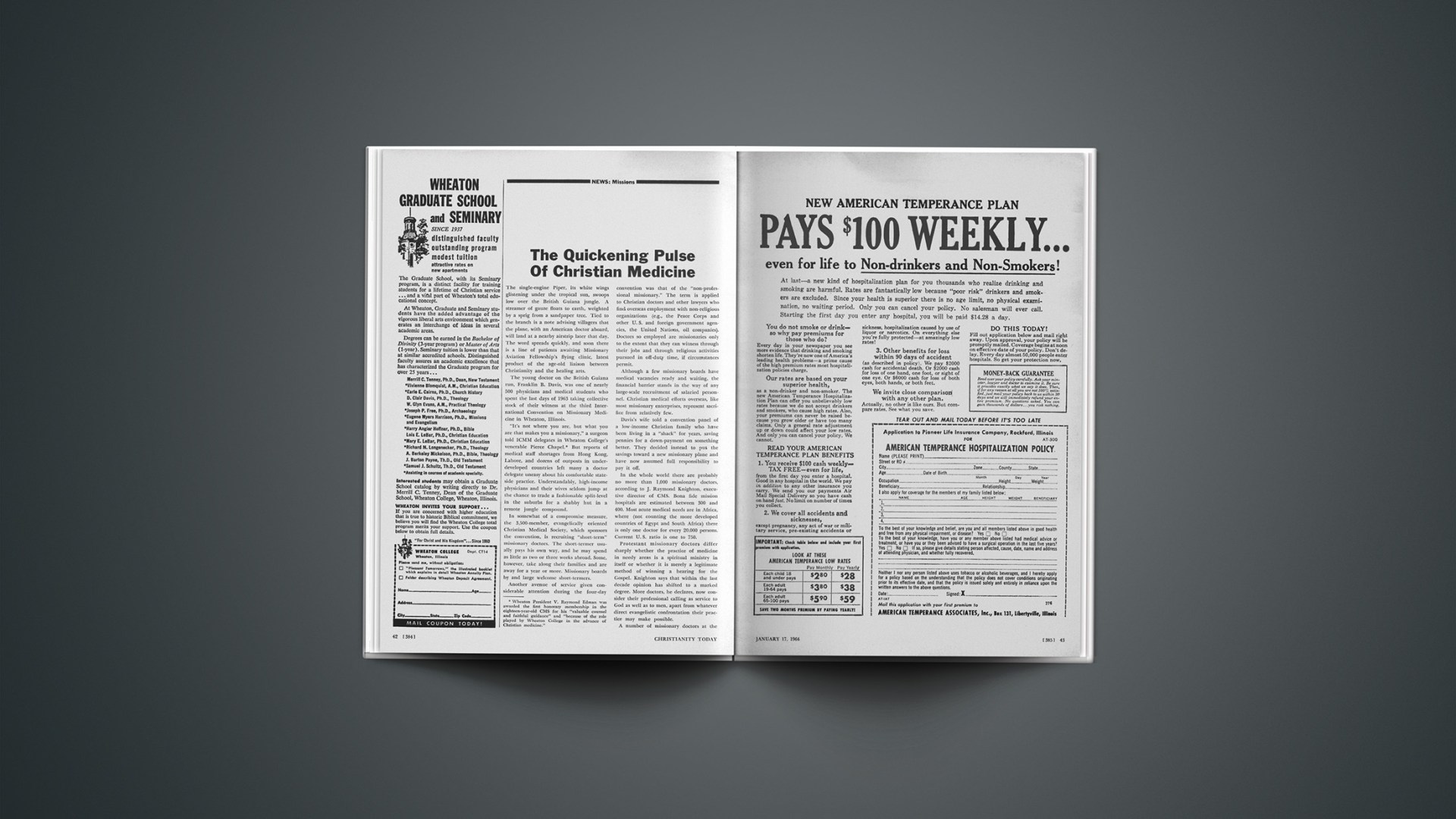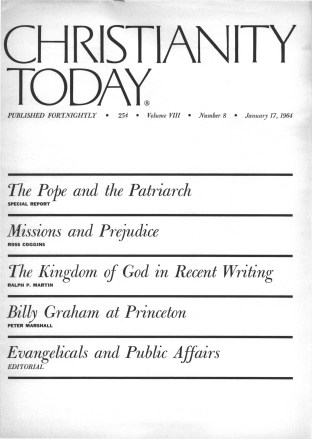The single-engine Piper, its white wings glistening under the tropical sun, swoops low over the British Guiana jungle. A streamer of gauze floats to earth, weighted by a sprig from a sandpaper tree. Tied to the branch is a note advising villagers that the plane, with an American doctor aboard, will land at a nearby airstrip later that day. The word spreads quickly, and soon there is a line of patients awaiting Missionary Aviation Fellowship’s flying clinic, latest product of the age-old liaison between Christianity and the healing arts.
The young doctor on the British Guiana run, Franklin B. Davis, was one of nearly 500 physicians and medical students who spent the last days of 1963 taking collective stock of their witness at the third International Convention on Missionary Medicine in Wheaton, Illinois.
“It’s not where you are, but what you are that makes you a missionary,” a surgeon told ICMM delegates in Wheaton College’s venerable Pierce Chapel.1Wheaton President V. Raymond Edman was awarded the first honorary membership in the eighteen-year-old CMS for his “valuable counsel and faithful guidance” and “because of the role played by Wheaton College in the advance of Christian medicine.” But reports of medical staff shortages from Hong Kong, Lahore, and dozens of outposts in underdeveloped countries left many a doctor delegate uneasy about his comfortable stateside practice. Understandably, high-income physicians and their wives seldom jump at the chance to trade a fashionable split-level in the suburbs for a shabby but in a remote jungle compound.
In somewhat of a compromise measure, the 3,500-member, evangelically oriented Christian Medical Society, which sponsors the convention, is recruiting “short-term” missionary doctors. The short-termer usually pays his own way, and he may spend as little as two or three weeks abroad. Some, however, take along their families and are away for a year or more. Missionary boards by and large welcome short-termers.
Another avenue of service given considerable attention during the four-day convention was that of the “non-professional missionary.” The term is applied to Christian doctors and other lawyers who find overseas employment with non-religious organizations (e.g., the Peace Corps and other U. S. and foreign government agencies, the United Nations, oil companies). Doctors so employed are missionaries only to the extent that they can witness through their jobs and through religious activities pursued in off-duty time, if circumstances permit.
Although a few missionary boards have medical vacancies ready and waiting, the financial barrier stands in the way of any large-scale recruitment of salaried personnel. Christian medical efforts overseas, like most missionary enterprises, represent sacrifice from relatively few.
Davis’s wife told a convention panel of a low-income Christian family who have been living in a “shack” for years, saving pennies for a down-payment on something better. They decided instead to put the savings toward a new missionary plane and have now assumed full responsibility to pay it off.
In the whole world there are probably no more than 1,000 missionary doctors, according to J. Raymond Knighton, executive director of CMS. Bona fide mission hospitals are estimated between 300 and 400. Most acute medical needs are in Africa, where (not counting the more developed countries of Egypt and South Africa) there is only one doctor for every 20,000 persons. Current U. S. ratio is one to 750.
Protestant missionary doctors differ sharply whether the practice of medicine in needy areas is a spiritual ministry in itself or whether it is merely a legitimate method of winning a hearing for the Gospel. Knighton says that within the last decade opinion has shifted to a marked degree. More doctors, he declares, now consider their professional calling as service to God as well as to men, apart from whatever direct evangelistic confrontation their practice may make possible.
A number of missionary doctors at the convention reported that their medical efforts are sometimes hamstrung because of prevailing religious and cultural practices, particularly in underdeveloped countries. Millions of Muslim women, for instance, suffer needlessly because they regard it a violation of religious scruples to be treated by a male doctor. In Africa, the widespread practice of female circumcision is a major health problem, with adverse effects in subsequent childbirth and in resulting emotional attitudes. Illiteracy itself is an impediment to medical progress. So are the general suspicion of Western medicine and qualms about surgery and blood transfusions. Poor sanitation is perhaps the worst enemy of all.
Preceding the convention was a “Missionary Health Workshop,” the first ever held. It attracted representatives from thirty-eight mission boards, including those from Methodist, Southern Baptist, United Presbyterian, and Lutheran agencies. An evaluation committee proposed (1) continuing study of missionary health problems under auspices of CMS, and (2) “personality and emotional evaluation” of all missionaries and missionary candidates.
World Evangelism
The Commission on World Mission and Evangelism of the World Council of Churches convened in Mexico City, December 8–20. More than two hundred delegates, advisors, staff members, observers (including some Roman Catholics), and press correspondents from all over the world attended the conclave.
This was the first international missionary meeting since the Ghana Assembly in 1957, at which the International Missionary Council voted to become part of the World Council of Churches. The WCC’s CWME succeeds the old IMC.
W. A. Visser t Hooft, general secretary of the WCC, addressed the conference the first day and spoke against syncretism, arguing for the uniqueness of the Christian faith and stating that “tested missions defend nothing else than the right to bring the Gospel to all men,” and that “the Word of God still finds holes through which it can creep.”
The assembly received various reports and adopted a number of proposals:
1. The Theological Education Fund is to be continued for five more years, and four million dollars was voted to help improve the quality of the ministry in the younger churches.
2. The Christian Literature Fund was instituted for a five-year period, and it was agreed to seek three million dollars to support a program designed to increase indigenous writing and publication overseas.
3. The assembly committed itself to cooperation in intercontinental radio broadcasting with the Lutheran radio network, which is already in operation.
4. It endorsed and voted support to the World Student Christian Federation, which seeks to develop an adequate strategy for reaching the academic world with the Gospel.
5. It approved a report on the training of missionaries that endorsed the principle of ecumenically oriented missionaries who are less denominationally minded. Receiving as well as sending churches must decide who will serve and where, and sending churches must become receiving churches. Another committee report on education for mission stressed the need for education in local congregations. It was agreed that the World Council of Christian Education must be involved in this effort.
6. The role of lay missionaries was acknowledged, and suggestions were made for helping laymen to fulfill such a role in world mission.
7. The committee report on “Joint Action for Mission” endorsed church union, saying, “Full unity must always be recognized as our goal.” The need for joint action was stressed despite theological and ecclesiological differences.
8. A section on the witness to men of other faiths was divided over the issue of universalism, but when its report was rendered it warned against religious relativism and syncretism, singling out the temptations to “mix” beliefs and practices, the loss of conviction as to the finality of Jesus Christ, and the “sophistication that likes to feel itself at home in every variety of belief.” The need for dialogue was expressed, and one or two curious statements appeared to the effect that “the effort to approach all men of other faiths under the single category of ‘non-Christian’ and to prescribe a single approach to them all, is an ineffective beginning,” and that the Christian must have “respect for sincerity wherever found.”
9. In the section dealing with witness to men in the secular world, the received report said that “secularization opens up possibilities of new freedom and new enslavement for men.” “Reconciliation of men to God and men must in our day include not only persons but institutions and national and international life.” Christians must concern themselves not only with individuals “but also with the Kingdom of God as the destiny of mankind as a whole.”
10. The section on the witness of the congregation in its neighborhood stated that “the evidence of changed lives is often found in other areas than in a recognized congregation.… God is at work also in secular agencies.… The restoration and reconciliation of human life is being achieved … through secular agencies.…” (There was disagreement about the latter statement.) The section encouraged joint action and responsible risk in witness.
11. The section on the witness of the Church across national and confessional barriers rejoiced in the “achievements of organic unity of churches of varying traditions in what were mission fields.…” It called for men to cross all frontiers and to engage in joint action, which is only “an interim step.” We must be led, they said, “beyond our continuing division into a sacramentally united fellowship, which will make visible that we are one family in Christ. We must strive and pray for the restoration of the wholeness of fellowship that can only [some took exception to the word “only”] be received in the Eucharistic feast instituted by our Lord and that wholeness of witness that must be transmitted to the world. A divided Church is not only a scandal; it can become responsible for the death of men’s souls.”
Theological pluralism was evident everywhere. The presence of the Orthodox groups made for theological concessions in that direction, and only time will tell what form the new ecumenical theology will finally take. The conference represented what might be called the post-Kraemer era, in which his radical discontinuity concept and a denial of true points of contact seemed to be archaic. The idea of “respect for sincerity wherever found” seemed a curious anomaly if one really is to respect the “sincere” non-Christian whose religion permits him to kill infants, practice cult prostitution, and abuse women.
Church union remains the ecumenical goal and ideal, despite the fact that its attainment in the WCC will still leave more missionaries outside the ecumenical orbit than in it, and thousands of non-WCC churches will still leave a divided Christendom.
Perhaps most challenging to Reformation consciences was the approved statement (pleasing to the Orthodox communions and Romanism too) that “this unchanging calling in the changing world is expressed in the Eucharist in which the redemption of the world in Jesus Christ is offered continually for [my italics] and to the world.”
The assembly was an interesting, informative, and enriching experience, marked, oddly enough, by the presence of Dr. Carl McIntire of the International Council of Christian Churches, who staged a competitive meeting in Mexico City to highlight his opposition to the WCC.
HAROLD LINDSELL










